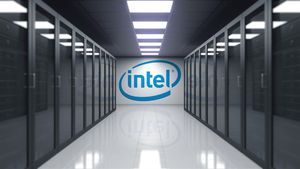
San Francisco, CA – September 24, 2025 – Rigetti Computing (NASDAQ: RGTI), a pioneer in quantum computing, has landed a significant three-year, $5.8 million contract from the Air Force Research Laboratory (AFRL). This pivotal agreement is set to accelerate the development of superconducting quantum networking technology, a critical step toward realizing scalable quantum computers and a secure quantum internet. The news has sent a ripple of excitement through the quantum computing sector, particularly impacting Rigetti's stock, which saw a notable surge following the announcement.
This contract not only provides substantial funding for Rigetti's cutting-edge research but also serves as a strong validation of its technological prowess and strategic direction. It underscores the increasing importance of quantum information science in national security and positions Rigetti as a key player in the race to unlock the full potential of quantum technology, with potential long-term implications for both the company's market standing and the broader industry landscape.
A Breakthrough in Quantum Networking and its Strategic Significance
The $5.8 million AFRL contract is specifically dedicated to advancing superconducting quantum networking. Rigetti will be collaborating with the Dutch quantum startup QphoX, a partnership designed to tackle one of quantum computing's most formidable challenges: converting the microwave signals used by superconducting qubits into optical photons capable of long-distance transmission over fiber optic networks. This microwave-to-optical conversion is fundamental for establishing entanglement between qubits across different quantum systems, a prerequisite for distributed quantum computing.
The project builds upon prior successes by Rigetti and QphoX in demonstrating qubit-transducer systems with optical single-shot qubit readout. Key objectives under this contract include optimizing qubit-to-transducer interfaces, scaling multi-chip quantum processors, and achieving room-temperature, long-range quantum state transfer via optical fibers. For Rigetti, this contract represents a profound validation of its superconducting quantum computing technology and its leadership in quantum networking. It secures vital funding for R&D, mitigates commercialization risks, and strengthens strategic partnerships with QphoX and the AFRL. Furthermore, aligning with national security priorities could open doors to future defense-related opportunities, enhancing Rigetti's market position and contributing to the U.S.'s goal of global leadership in quantum information science.
How This Event Might Affect the Market
The announcement of the Air Force contract had an immediate and tangible positive impact on Rigetti Computing's (NASDAQ: RGTI) stock. Following the news, Rigetti's shares experienced a significant surge, with reports indicating gains ranging from 15% to over 30%, and even a 48.46% increase over the preceding week. This momentum contributed to an approximate $250 million increase in Rigetti's market capitalization, reflecting bolstered investor confidence in the company's trajectory.
This positive market reaction is not solely attributable to the contract itself but also to broader market catalysts. A general bullish sentiment in the quantum computing sector, recent interest rate cuts by the Federal Reserve, and reports of potential U.S. administration executive orders supporting quantum technology development have all played a role. Additionally, Rigetti's recent unveiling of its 36-qubit multi-chiplet processor with improved fidelity and plans for a 100-qubit system by late 2025 further fueled investor optimism. While the contract signals strong potential, some analysts maintain a cautious stance on the stock's valuation, noting its high price-to-sales ratio and the long-term, speculative nature of quantum computing's commercial viability, with practical applications still considered years away.
In terms of companies that might win or lose, Rigetti Computing (NASDAQ: RGTI) and QphoX are the immediate and clear winners, benefiting from financial resources, technological validation, and enhanced market positioning. The contract also provides a positive ripple effect for the broader U.S. quantum computing sector, reinforcing the investment thesis for other publicly traded quantum companies such as IonQ (NYSE: IONQ), D-Wave Quantum (NYSE: QBTS), and Quantum Computing Inc. (NASDAQ: QUBT) by boosting investor confidence and signaling clear government priorities. While no explicit "losers" are named, the intensely competitive nature of the quantum industry means that companies lagging in securing such strategic contracts, failing to achieve significant breakthroughs in critical areas like quantum networking, or struggling with financial stability, may find themselves at a disadvantage against well-funded and government-backed players.
Broader Implications for the Quantum Industry
This contract signifies a crucial step towards accelerating the scaling of quantum computing beyond individual processors and realizing the vision of a secure, distributed quantum internet. By focusing on quantum networking, the industry is addressing a fundamental bottleneck that, once overcome, could unlock unprecedented computational capabilities. The ability to entangle and transmit quantum information over long distances is not just about building bigger quantum computers but about creating a global quantum infrastructure.
Moreover, the Air Force contract underscores the escalating importance of quantum information science for national security. This trend will likely drive increased government R&D spending in the sector, potentially shaping the direction of future quantum research towards defense and intelligence applications. This shift signals a gradual move from purely theoretical research to more applied development, aiming to translate fundamental breakthroughs into tangible capabilities with strategic value. However, despite this progress and increased investor attention, the quantum computing industry remains in its nascent stages. Investments are still considered high-risk with the potential for substantial long-term rewards, necessitating a long-term perspective from investors. The collaboration between Rigetti and QphoX also highlights the growing emphasis on hybrid quantum-classical systems and the critical need for robust interconnects to link diverse quantum technologies effectively.
What to Pay Attention to Next
In the short term, investors and industry watchers should closely monitor Rigetti's progress in achieving the technical milestones outlined in the AFRL contract, particularly regarding the optimization of qubit-to-transducer interfaces and the demonstration of long-range quantum state transfer. Any significant breakthroughs or delays in these areas could directly impact investor sentiment and the company's stock performance. Additionally, watch for further government initiatives or executive orders from the U.S. administration aimed at bolstering the quantum technology sector, as these could provide additional funding opportunities and strategic direction for companies like Rigetti.
Longer-term, the success of this quantum networking project could pave the way for distributed quantum computing architectures, fundamentally changing how quantum resources are accessed and utilized. This could lead to new market opportunities for quantum cloud services, secure communication networks, and advanced sensor technologies. Investors should also pay attention to how Rigetti leverages this government validation to attract further commercial partnerships and accelerate the development of practical quantum applications. The evolution of the competitive landscape, particularly how major tech firms like Google, IBM, and Microsoft respond to specialized advancements in quantum networking, will also be crucial.
Conclusion
Rigetti Computing's $5.8 million Air Force contract is a pivotal development that provides critical funding and robust validation for its superconducting quantum networking technology. This strategic win not only bolsters Rigetti's financial stability and technological leadership but also positions it as a key player in the race to establish a functional quantum internet, a development crucial for the long-term scalability of quantum computing. The immediate positive impact on Rigetti's stock price reflects increased investor confidence and a growing recognition of the strategic importance of quantum information science.
Moving forward, the quantum computing market, while still speculative, is showing increasing signs of maturation, driven by significant government investment and targeted R&D. Investors should continue to monitor Rigetti's execution on this contract, alongside broader industry trends in quantum networking and the commercialization of quantum applications. The successful development of robust quantum networking capabilities could unlock a new era of distributed quantum computing, presenting both immense opportunities and complex challenges for the industry. The coming months will be critical in demonstrating the tangible progress that this contract promises.
This content is intended for informational purposes only and is not financial advice





